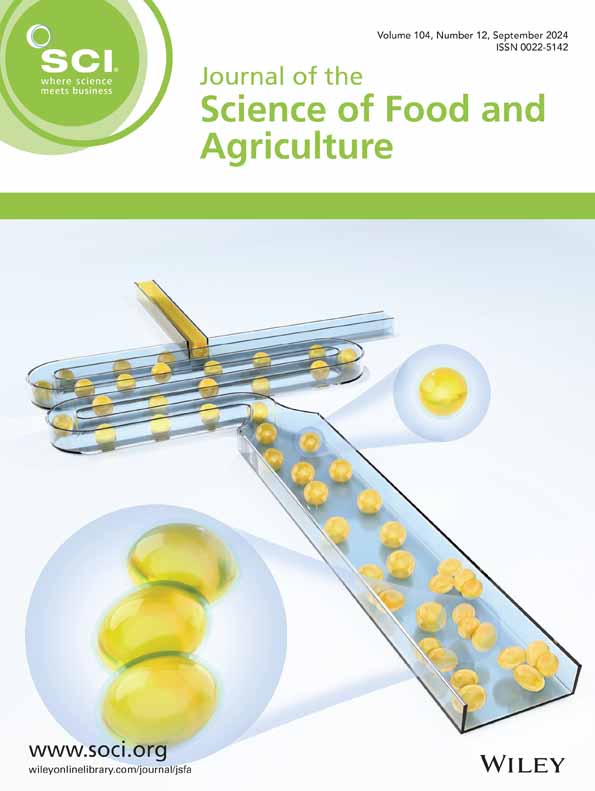Anuj Ranjan, Vishnu D Rajput, Sudhir Shende, Pallavi Saxena, Evgeniya V Prazdnova, Svetlana Sushkova, Jayati Arora, Abhishek Chauhan, Tanu Jindal, Sajad Majeed Zargar, Tatiana Minkina
求助PDF
{"title":"Eco-friendly fabrication of Zn-based nanoparticles: implications in agricultural advancement and elucidation of toxicity aspects.","authors":"Anuj Ranjan, Vishnu D Rajput, Sudhir Shende, Pallavi Saxena, Evgeniya V Prazdnova, Svetlana Sushkova, Jayati Arora, Abhishek Chauhan, Tanu Jindal, Sajad Majeed Zargar, Tatiana Minkina","doi":"10.1002/jsfa.14243","DOIUrl":null,"url":null,"abstract":"<p><p>Zinc (Zn) is a vital micronutrient required for optimal plant growth and soil fertility. Its use in the form of nanoparticles (NPs) has gained significant attention in agricultural applications. Green synthesized Zn-based NPs offer an eco-friendly solution to several conventional problems in agriculture. Several plants, bacteria, fungi and yeast have shown significant potential in fabricating Zn NPs that can provide environmentally friendly solutions in agriculture and the approach is aligned with sustainable agricultural practices, reducing the dependency on harmful agrochemicals. Zn-based NPs act as plant growth promoters, enhance crop yield, promote resilience to abiotic stressors and are efficient crop protection agents. Their role as a smart delivery system, enabling targeted and controlled release of agrochemicals, further signifies their potential use in agriculture. Because agriculture requires repeated applications hence, the toxicological aspects of Zn NPs cannot be ignored. Zn NPs are reported to cause phytotoxicity, including root damage, physiological and biochemical disturbances, and genotoxic effects. Furthermore, exposure to Zn NPs poses risks to soil microbiota, and aquatic and terrestrial organisms potentially impacting the ecosystem. The green synthesis of Zn-based NPs has a promising aspect for advancing sustainable agriculture by reducing agrochemical use and improving crop productivity. Their diverse applications as plant growth promoters, crop protectants and smart delivery systems emphasize their potential. However, the toxicological aspects are essential to ensure the standardization of doses for their safe and effective use. Further research would help address such concerns and help in developing viable and eco-friendly solutions for modern agriculture. © 2025 Society of Chemical Industry.</p>","PeriodicalId":17725,"journal":{"name":"Journal of the Science of Food and Agriculture","volume":" ","pages":""},"PeriodicalIF":3.3000,"publicationDate":"2025-04-06","publicationTypes":"Journal Article","fieldsOfStudy":null,"isOpenAccess":false,"openAccessPdf":"","citationCount":"0","resultStr":null,"platform":"Semanticscholar","paperid":null,"PeriodicalName":"Journal of the Science of Food and Agriculture","FirstCategoryId":"97","ListUrlMain":"https://doi.org/10.1002/jsfa.14243","RegionNum":2,"RegionCategory":"农林科学","ArticlePicture":[],"TitleCN":null,"AbstractTextCN":null,"PMCID":null,"EPubDate":"","PubModel":"","JCR":"Q1","JCRName":"AGRICULTURE, MULTIDISCIPLINARY","Score":null,"Total":0}
引用次数: 0
引用
批量引用
Abstract
Zinc (Zn) is a vital micronutrient required for optimal plant growth and soil fertility. Its use in the form of nanoparticles (NPs) has gained significant attention in agricultural applications. Green synthesized Zn-based NPs offer an eco-friendly solution to several conventional problems in agriculture. Several plants, bacteria, fungi and yeast have shown significant potential in fabricating Zn NPs that can provide environmentally friendly solutions in agriculture and the approach is aligned with sustainable agricultural practices, reducing the dependency on harmful agrochemicals. Zn-based NPs act as plant growth promoters, enhance crop yield, promote resilience to abiotic stressors and are efficient crop protection agents. Their role as a smart delivery system, enabling targeted and controlled release of agrochemicals, further signifies their potential use in agriculture. Because agriculture requires repeated applications hence, the toxicological aspects of Zn NPs cannot be ignored. Zn NPs are reported to cause phytotoxicity, including root damage, physiological and biochemical disturbances, and genotoxic effects. Furthermore, exposure to Zn NPs poses risks to soil microbiota, and aquatic and terrestrial organisms potentially impacting the ecosystem. The green synthesis of Zn-based NPs has a promising aspect for advancing sustainable agriculture by reducing agrochemical use and improving crop productivity. Their diverse applications as plant growth promoters, crop protectants and smart delivery systems emphasize their potential. However, the toxicological aspects are essential to ensure the standardization of doses for their safe and effective use. Further research would help address such concerns and help in developing viable and eco-friendly solutions for modern agriculture. © 2025 Society of Chemical Industry.
环保制造的锌基纳米颗粒:在农业进步和阐明毒性方面的影响。
锌(Zn)是植物生长和土壤肥力所需的重要微量元素。它以纳米颗粒(NPs)的形式在农业应用中得到了极大的关注。绿色合成锌基NPs为农业中的几个传统问题提供了一个环保的解决方案。几种植物、细菌、真菌和酵母在制造锌纳米粒子方面显示出巨大的潜力,这些纳米粒子可以为农业提供环境友好的解决方案,而且这种方法与可持续农业实践相一致,减少了对有害农用化学品的依赖。锌基NPs具有促进植物生长、提高作物产量、增强作物抗非生物胁迫能力等作用,是一种高效的作物保护剂。它们作为一种智能输送系统的作用,使农用化学品能够有针对性和可控地释放,进一步表明它们在农业中的潜在用途。由于农业需要重复施用,因此锌NPs的毒理学方面不容忽视。据报道,锌NPs会引起植物毒性,包括根损伤、生理生化紊乱和遗传毒性效应。此外,暴露于Zn NPs对土壤微生物群以及水生和陆生生物构成风险,可能影响生态系统。绿色合成锌基NPs通过减少农药使用和提高作物生产力来推进可持续农业具有广阔的前景。它们在植物生长促进剂、作物保护剂和智能输送系统等方面的广泛应用凸显了它们的潜力。然而,毒理学方面的问题对于确保剂量的标准化以确保其安全和有效使用至关重要。进一步的研究将有助于解决这些问题,并有助于为现代农业开发可行的、环保的解决方案。©2025化学工业协会。
本文章由计算机程序翻译,如有差异,请以英文原文为准。

 求助内容:
求助内容: 应助结果提醒方式:
应助结果提醒方式:


